Strange Envelopes Containing 5000 Kuna Each Appear in Strasnik...
January the 16th, 2021 - The Petrinja earthquake which struck the central Croatian area of Sisak-Moslavina at the end of what was a truly horrendous pandemic-dominated 2020 saw the almost total collapse of Petrinja, enormous damage done to Sisak, Glina and surrounding areas, and even the tragic loss of several lives. Strasnik, being the epicentre, is one area which suffered tremendous damage as a result of the natural disaster, and strange things are continuing to happen there...
Imagine wandering along the streets of Strasnik, now covered in rubble and filled with a sense of post-earthquake tension, and stumbling upon an envelope with 5000 kuna stuffed inside it as you check your mail? Not a bad surprise in a sea of truly terrible luck. What if multiple such envelopes were being found at addresses throughout Strasnik? That's precisely what's been happening.
As Poslovni Dnevnik writes, an anonymous donor sent four men to the affected area of Strasnik in central Croatia, and they left envelopes containing 5000 kuna inside them at many addresses, and the children living there also received toys.
According to a report from Jutarnji list, four men in a mysterious SUV with a shipment from an anonymous donor arrived in the village of Strasnik, the epicentre of the devastating earthquake that hit the Petrinja area on December the 29th last year.
''Good afternoon, this is for you. There's an envelope with five thousand kuna in it, do you have any children? You have? Great, we also brought sweets for them too, to cheer them up a bit. We don't have much time to talk, we have to move on,'' they said to Strasnik's bewildered residents, as reported by Jutarnji list.
Jutarnji unofficially learned that the anonymous donor is apparently Giuseppe Nardi, the president of the board of the German pharmaceutical company Dr. Theiss and the owner of its Croatian subsidiary NaturProdukt. They will also visit other villages and intend to distribute 45 or 46 such donations, which is equal to about 230 thousand kuna.
For more on the Petrinja earthquake, follow our dedicated section.
Green-Left Bloc Refuse to Get Vaccinated Under Priority Vaccination Programme for MPs
ZAGREB, 15 January, 2021 - The parliamentary group of the Green-Left Bloc have refused to undergo vaccination against COVID-19 as part of a priority vaccination programme for MPs, saying that there is not enough vaccine at this point and the doses intended for them should be administered to health workers and vulnerable groups.
"All members of the Green-Left Bloc want to get vaccinated against coronavirus and support the vaccination of as many people as possible. What's more, we think the vaccination is the only way for us to get back to at least a semblance of normality and halt the pandemic that has turned all our lives upside down," the group said in a statement on their Facebook page on Friday.
They said that, like ordinary citizens, they had contacted their GPs and signed up for vaccination as soon as there was enough vaccine for the general public.
A third of lawmakers, or 51, have signed up for vaccination, scheduled for Monday at 1pm.
Parliament Speaker Gordan Jandroković has said it is important that MPs get vaccinated in order to send a message as politicians that vaccination is necessary and important and that it can help in the fight against COVID-19. He dismissed claims that it was lawmakers' privilege.
Petrinja Mayor Satisfied With Legislative Solutions for Post-Quake Reconstruction
ZAGREB, 15 January, 2021 - Petrinja Mayor Darinko Dumbović said on Friday that he was satisfied with the proposed legislative regulations for the reconstruction of damaged houses in the quake-hit areas of Sisak-Moslavina County, which will entirely be financed from the state budget.
Asked by reporters if he was satisfied with the legislative regulation on reconstruction, Dumbović said that any law that will be quickly implemented was good.
He elaborated that he was satisfied that the 60:20:20 formula for financing the post-quake reconstruction, which will be applied in Zagreb, had been amended for the quake-affected areas in Sisak and Karlovac Counties so the rebuilding of the damaged houses in that region should be entirely covered from the state budget.
On Thursday, the government sent to the parliament draft amendments to the law on the post-quake reconstruction of the City of Zagreb, Krapina-Zagorje and Zagreb Counties to include the regulation of the reconstruction of Sisak-Moslavina and Karlovac Counties, hit by the 29 December 6.2 magnitude quake.
The state will provide full funding for the reconstruction of the property in which the owner lives in these two counties (Sisak and Karlovac) since they are underdeveloped, according to the explanation provided by Construction Minister Darko Horvat on Thursday.
The law on Zagreb's post-earthquake reconstruction envisages that 60% of the reconstruction cost will be financed by the government, 20% by the local authorities and 20% by property owners.
During his visit to Petrinja, Deputy Prime Minister Boris Milošević today underscored the importance of good cooperation with local government without which results would be absent.
"NGOs are an added value and we have to act together as a team. Any donation helps the people and we have to be grateful for them. It is important that everyone is in warmth and that they have a hot meal," said Milošević.
A delegation of the Serb National Council (SNV) visited Gornja Bačuga where it donated five stoves to vulnerable families and presented a donation from the Red Cross consisting of 500 pairs of rubber boots, adding that another 1,000 pairs are expected to arrive soon.
Health Minister Satisfied With Situation at Sisak Hospital
ZAGREB, 15 January, 2021 - Health Minister Vili Beroš on Friday visited the Sisak General Hospital, situated in the earthquake-affected area, saying he was satisfied with the situation there.
Since 5 January, 223 patients have been hospitalised there and 1,927 patients have been examined in the outpatient clinics. "These figures show the will of the staff and director of the hospital to provide adequate medical assistance," Beroš said.
He said that the ministry had contributed to the health system's response in terms of redistribution of patients after the 29 December earthquake, adding that there had been no major problems with the transport of patients to other hospitals.
Beroš said that at today's meeting they had discussed plans for the revitalisation of the Sisak hospital. He said that the provision of healthcare was currently complicated by the fact that the hospital's wards had been moved to three different locations.
"Now is the time after this tragedy to sum things up, determine the further course of action and present the best ideas for this area," the minister said, adding that the government would support such ideas.
Speaking of the coronavirus situation in the country, Beroš said that the government had decided to keep the current restrictions in place until the end of the month, citing the increased mobility of people, a rising incidence in some countries and the emergence of a new strain of the virus. As for the earthquake-affected area, he said that they had expected a larger number of coronavirus cases but that that had not happened.
World Handball Championship: Croatia and Japan Draw in 1st Match of Group C (29:29)
January 15, 2021 - Croatia and Japan draw in the first round of Group C at the World Championship in Egypt.
After the tournament host Egypt and Chile opened the 2021 World Handball Championship on Wednesday, and a day later seven more first-round matches were played, the Croatia handball team met Japan to begin their Group C campaign at the World Championship in Egypt.
On Thursday, coach Lino Červar wrote off four players for the first round of the competition, thus cutting the player list to 16 names to begin Croatia's journey at the World Champs.
Croatia is the favorite of Group C, which also includes Angola and Qatar.
Croatia v. Japan Recap
Strlek put Croatia in the lead in the first minute for 1:0, though Japan equalized moments later from a 7-meter shot for 1:1. Japan took the lead in the 3rd minute for 1:2.
Strlek scored the equalizer for 2:2 in the 5th minute. Japan scored for 2:3 in the 6th, and 2:4 in the 7th. Japan was up by 3 goals in the 10th minute, up by 4 in the 11th, and up by 5 just moments later.
Martinovic gave Croatia life again in the 12th minute for 3:7 and again for 4:7 in the 14th.
Mamic scored for 5:8 in the 15th and Maric for 6:9 in the 16th.
Japan was up by 5 goals in the 19th minute - 7:12.
Horvat scored for 8:12 in the 20th minute.
Japan had its biggest lead in the 22nd minute - 8:14. Martinovic scored for 9:14 moments later.
Japan took advantage of Croatia's shaky defense and scored in almost every attack. Croatia missed many certain goals, which came back to haunt them.
Horvat scored for 11:16 in the 25th minute.
With one minute to go in the first half, Cindric scored for 14:17, which was the result going into halftime.
Maric scored for Croatia to open the second half and bring them only two goals behind - 15:17 in the 31st minute. Cindric scored for 16:18 in the 33rd minute. Cupic made it 17:19 in the 37th.
Japan was up by four goals in the 39th minute.
Maric scored for 18:21 in the 40th minute. Horvat scored for 19:22 in the 42nd.
Duvnjak finally scored for 20:22 in the 43rd minute and again for 21:22 in the 45th. Cindric scored for 22:23.
Croatia finally equalized in the 48th minute thanks to a Brozovic goal for 23:23! It took them nearly all game.
Duvnjak made it 24:24 with 10 minutes to go and Maric scored yet again for 25:25!
Cindric scored for 26:26 with 7 minutes to go and 25:25 with 5 minutes to go.
Cupic scored from 7-meters with 3 minutes to go - 28:28.
Cupic scored for 29:29, which was the final result of the game.
The three best teams from each group will advance and transfer points to the next round.
In the second round, there will be four groups with six national teams each, and the two best will advance to the quarterfinals, from which they will play by knockout until the end of the competition.
Group C intersects with Group D, which includes Denmark, Argentina, Bahrain, and DR Congo.
To read more about sport in Croatia, follow TCN’s dedicated page.
Two Croatian Hotels Win Prestigious HolidayCheck Special Award
January 15, 2021 – The renowned Swiss portal HolidayCheck awarded the prestigious HolidayCheck Special Award 2021. Among 607 awarded hotels, there were also two Croatian hotels – Hotel Miramar in Opatija and Hotel Plaža Duće in Dugi Rat.
As reported by Nera Miličić, head of the Croatian National Tourist Board in Munich, the best and most successful hotels in as many as 35 countries have been selected according to more than 420 thousand reviews from portal users. In Croatia, the award was given to the Miramar Hotel in Opatija and the Hotel Plaža Duće in Dugi Rat.
"As an indicator of guest satisfaction in the world, the HolidayCheck portal is a benchmark that guests use with confidence to check the quality of accommodation. The award ceremony once again shows the specificity of the tourist year behind us. Also, it classifies our hotels and Croatia as a destination that stands out with its offer even in challenging pandemic conditions," said Miličić.
As the entire hospitality sector faced extraordinary circumstances, certain adjustments were made to the HolidayCheck award. The minimum qualification criteria were at least 25 published reviews for the hotel from December 1, 2019, to November 30, 2020, at least 90 percent of user recommendations and adherence to the HolidayCheck Code of Conduct.
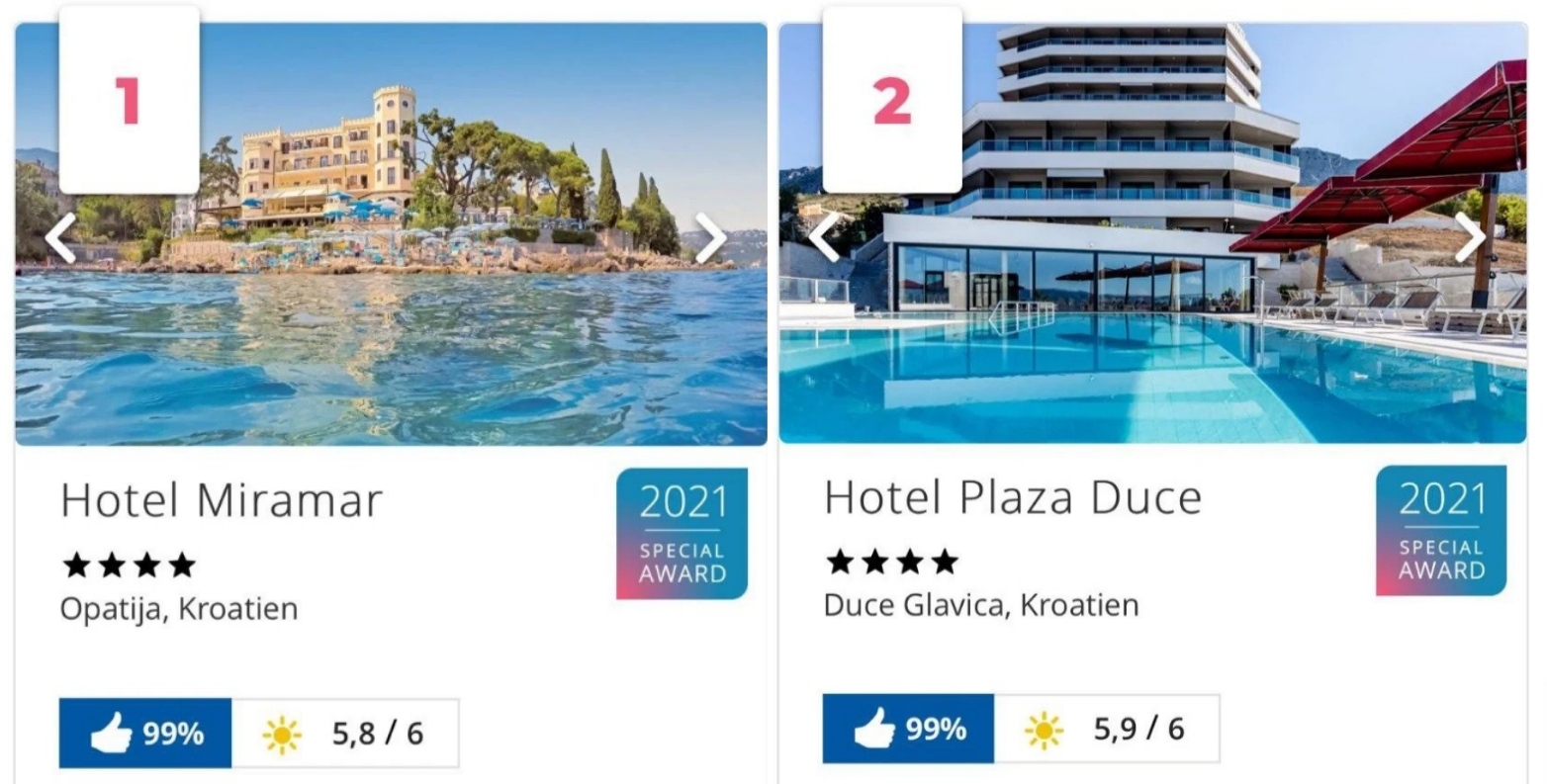
Source: Croatian National Tourist Board
Among the hotels that meet these criteria, only the ten most popular hotels from a particular region can win the award. In addition to custom criteria, this year's award has a new design and is called "HolidayCheck Special Award 2021."
The HolidayCheck portal is the largest independent travel web portal in the German-speaking area. Based on authentic reviews, of which almost 10 million have been published on the hotels alone, it enables reservations and reviews of numerous offers. The portal offers a range of important and up-to-date information on destinations around the world. It attaches the most significant importance to the reviews of the travelers who have stayed in a place.
Thanks to authentic reviews and expert advice, every tourist can find and book the best vacation for themselves in locations worldwide. The portal has been operating since 2003 and is headquartered in Bottighofen, Switzerland, near the German border town of Constance.
For the latest travel info, bookmark our main travel info article, which is updated daily.
Read the Croatian Travel Update in your language - now available in 24 languages.
Advent Made Opatija One of the Top Croatian Destinations in December 2020
January 15, 2021 – Kvarner beauty Opatija was one of the top Croatian destinations in December 2020, taking second place in overnight hotel stays. The most beautiful Advent made Opatija a desirable winter destination.
Despite the dark cloud that reigned this winter, Opatija, with its attractive Advent program, still managed to shine as a beacon of hope. This December, the city was brighter than ever before, lit with more than 20 kilometers of lamps, over 10,000 decorations, and dozens of large decorations.
The story of the "Christmas miracle" in the cradle of Croatian tourism attracted many Opatija residents and visitors. As Opatija Tourist Board reports, in December 2020, Opatija was the best destination in Kvarner and the fourth in Croatia in terms of the overall number of overnight stays. Opatija is in second place in Croatia, right after the Croatian capital when it comes to overnight hotel stays.
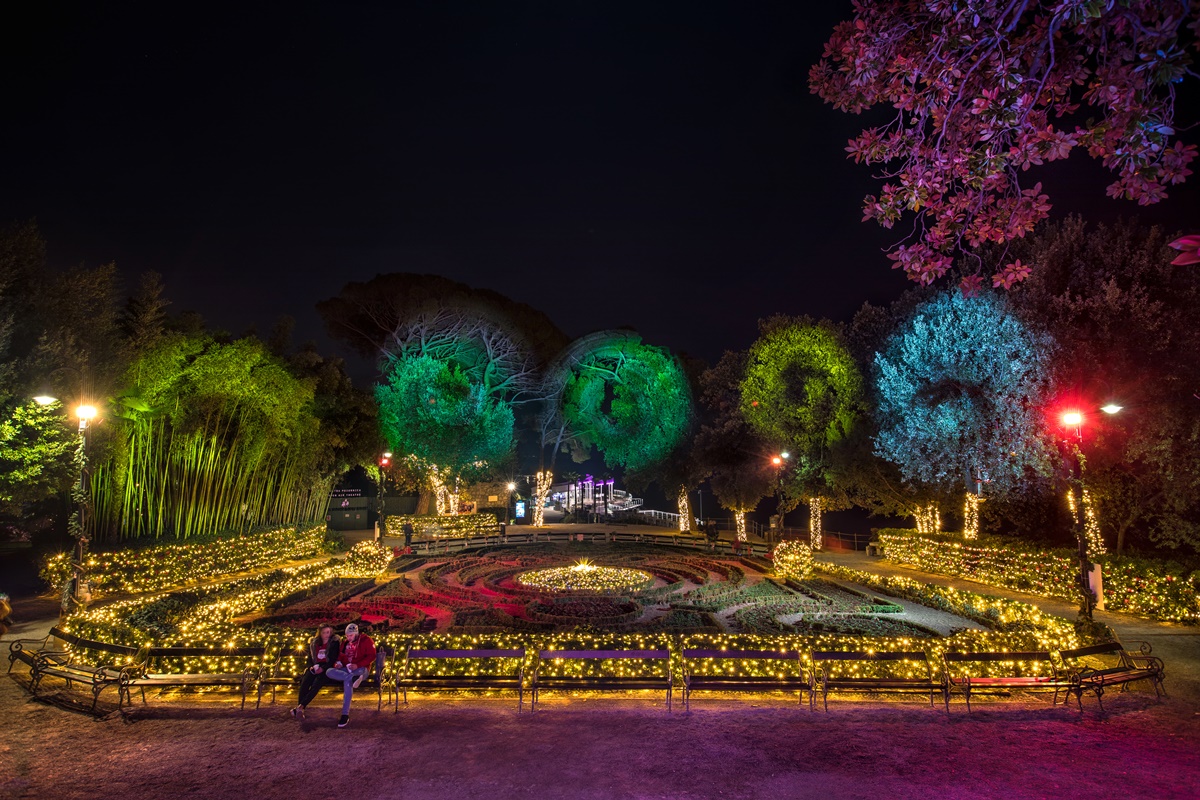
Source: Visit Opatija
The magic of the most beautiful and breathtaking Advent by the sea was recorded in thousands of photos and videos, with shots of romantic evening walks, friendly gatherings, and family happiness, which passed all over Croatia and the world.
However, in addition to the city guests, Opatija Advent's magical beauty was experienced by many "virtual" visitors. Namely, many digital attractions such as virtual walks, music cards, videos, and photos, made Opatija's Advent even more attractive, measuring hundreds of thousands of reviews.
Such a campaign attracted the interest of both Croatian and foreign media. It resulted in numerous publications, especially on the Italian, Austrian, Hungarian and Slovenian markets, with a total reach of several million people. Croatian media also accompanied Opatija's "Christmas fairy tale" with hymns, declaring it the most beautiful Advent in Croatia.

Source: Visit Opatija
"This year, we confirmed that Advent in Opatija is one of the most important winter events in Croatia. The most beautiful Advent by the sea is the foundation on which we build the future of Opatija as a popular winter destination, which is in line with its tourist tradition. The city is becoming one of the most important Advent destinations in this part of Europe," said Suzi Petričić, director of the Opatija Tourist Board, the creator of Opatija's Advent attire.
Advent in Opatija is slowly coming to an end, and those who want to take the last opportunity to feel the magic of the most beautiful Advent by the sea can visit it until Sunday, January 17th. This year's edition of Advent in Opatija was recognized as a thread of optimism in these difficult circumstances and won countless hearts.
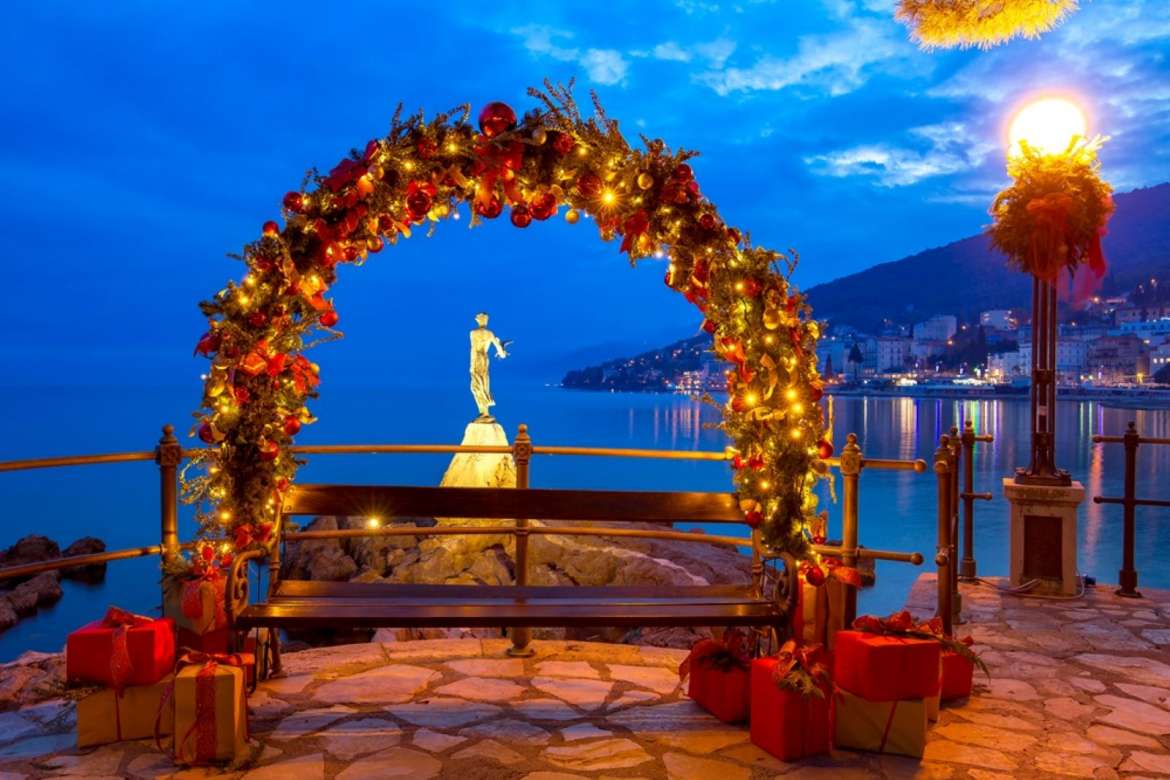
The most beautiful Advent by the sea / Source: Visit Opatija
For the latest travel info, bookmark our main travel info article, which is updated daily.
Read the Croatian Travel Update in your language - now available in 24 languages.
Par'l Committee: Concrete Support to Farmers in Earthquake-Hit Areas Needed Now
ZAGREB, 15 January, 2021 - Farmers in earthquake-hit areas need concrete help immediately so that they can stay and live and work there, it was said at a meeting of the parliamentary Agriculture Committee on Friday.
In three months' time the committee will convene to analyse what has been done to assist people affected by the earthquakes in 2020.
Farmers are faced with many problems - damaged houses, farm buildings and equipment, polluted wells and buyers who are taking advantage of the situation and offering low prices for their cattle, the committee heard.
The one thing that is obvious is that no one wants to leave their homes, the committee chair, MP Marijana Petir, said.
She said that farmers should be provided with temporary accommodation as soon as possible but also with shelter for farm animals. "We need to act quickly and concretely because if farms shut down, they will never reopen," underscored Petir.
She added that applications for farm support need to be make simpler for earthquake-hit areas as farmers there cannot meet the current criteria.
Everyone needs help immediately
Božidar Antolec from a local action group called for help so that local farmers can place their products on the market and that they be temporarily exempted from paying contributions or at least that they be deferred.
Croatian Chamber of Agriculture (HPK) president Mladen Jakopović said that two large retail chains had offered to place farmers' products from earthquake areas on their shelves through a simplified procedure and one had promised logistics in that regard.
The HPK advocates that support should be provided so that people remain in the area. Jakopović said that the HPK was delivering the first of several housing containers to the area today.
The committee's deputy chair, MP Ružica Vukovac (DP), said that there were problems on the ground, presenting an example in Donja Bačuga where it took three days for the competent services to save a herd of cattle, which, she said, showed that there was a problem in the chain of command.
Agriculture Minister Marija Vučković and state secretary Tugomir Majdak rejected this criticism, saying that they had been in the field constantly.
"That is not a realistic description. The cattle wasn't abandoned and there is no need to exaggerate the situation," Minister Vučković said.
She supported the suggestion that the majority of local products should be used in local kindergartens, schools, hospitals. "We are working on that, however, it is necessary to increase production in that area," she underscored.
Projects valued at more than HRK 1 billion agreed to
Speaking about rural development measures, Vučković said that by 13 January projects valued at HRK 1.08 billion had been agreed to for Sisak-Moslavina County and that HRK 851 million had been paid out. HRK 137 million refers to social and utility infrastructure and HRK 67 million of that has been paid out.
Rural development measures for family-run farms valued at HRK 164 million have been agreed to for 81 projects and 29 projects valued at HRK 1.7 million have been agreed to for emergency aid due to the consequences of the COVID-19 pandemic.
A total of 451 projects for the development of small farms, launching of non-farming activities and support to young farmers valued at HRK 80.3 million have also been agreed to, said Vučković and added that direct payments were accelerated and that to date HRK 93 million, which is usually paid as of 15 February, had already been paid out.
Globalisation Threatens Croatia's Produce and Cuisine Via New Seed Laws
January 15, 2021 – The EU is being backed into a corner by the giants of globalised agriculture. Pre-empting a change in EU-farming directives, a new bill before the Croatian parliament seeks to regulate seed use for the country's farmers, putting at risk Croatia's distinct, regional produce and the country's famous cuisine. TCN interviews one of those leading the fight for Croatia's produce and cuisine.
Question: When is a tomato not a tomato? Answer: When it is a Croatian tomato.
Confused? Well, if you're from Croatia and never much left the country or region, you might be. But, if you're from western Europe or America and you've enjoyed a visit to Croatia, you'll know exactly what this means. As will any Croats who have emigrated to supposedly more 'developed' parts of the world. Food just doesn't taste the same in those places.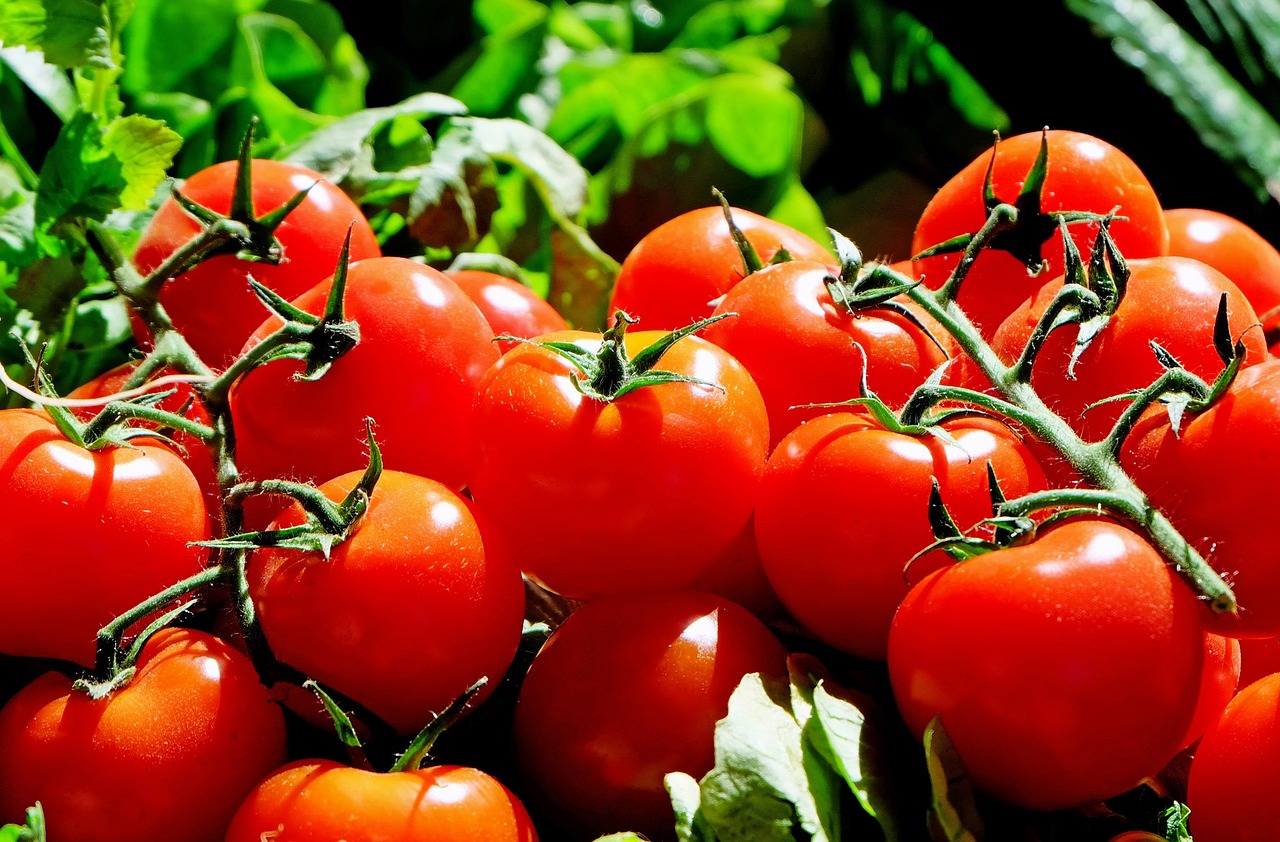 The efforts of small-scale producers, family afrmers and those preserving distinct, traditional crops help give Croatia's produce and cuisine its unique reputation and flavour
The efforts of small-scale producers, family afrmers and those preserving distinct, traditional crops help give Croatia's produce and cuisine its unique reputation and flavour
As TCN touched on in our recent feature about food prices in Croatia (and its impact on health), in the supermarkets of western Europe and in America, everything is available, all of the time. People live in a globalised marketplace where seasonal availability is meaningless when your country and its giant supermarket brands have the power to export from anywhere. But, though everything is always available in these supermarkets, not everything on display is what it seems to be.
In Dalmatia, they like to pride themselves on a generally very simple approach to cooking. Good olive oil, salt, maybe a dash of fresh lemon, garlic and parsley is all you need to make a meal sing. And the surprised, delighted faces of their customers tell them they are right. But, that's far from the full story. It is not the simple approach to seasoning, spicing and condiments alone that brings Dalmatian cuisine to life, it is the base ingredients themselves.
The blitva (chard) stewed in potato, that so easy yet unreproducible shredded cabbage salad, and the similarly simple tomato salad are spectacular to visitors because their main ingredients sing. They sing in way that vegetables bought in supermarkets in western Europe and America do not. They do so because, in Croatia, you can easily choose to eat locally grown, seasonal vegetables and fruits. And these taste a whole lot better than the industrially farmed products that line the shelves in other regions. That's why, in Croatia, a tomato still tastes like a tomato. Whereas a tomato from a supermarket elsewhere tastes like... nothing.
Countless unclassified regional varieties of vegetables and fruits, often grown by small-scale producers or on family farms (OPGs) help give Croatia's produce and cuisine this incredible reputation among visitors. But, as the multi-billion dollar, globalised industry of farming-without-season extends its grip around the world, it is the rights of these distinct farmers which is most at threat.
The European Union is attempting to change its laws and directives for the regulation of seed use within all member states. Pressured by the enormous powers of the global agricultural industry, and partially in an attempt to protect its farmers, it wishes to adopt new laws or regulations to replace extremely outdated earlier versions. Pre-empting this change, a law has been put before the Croatian parliament which seeks to regulate seed use in Croatia. It's a rather complicated piece of legislation and is currently only at the stage of proposal.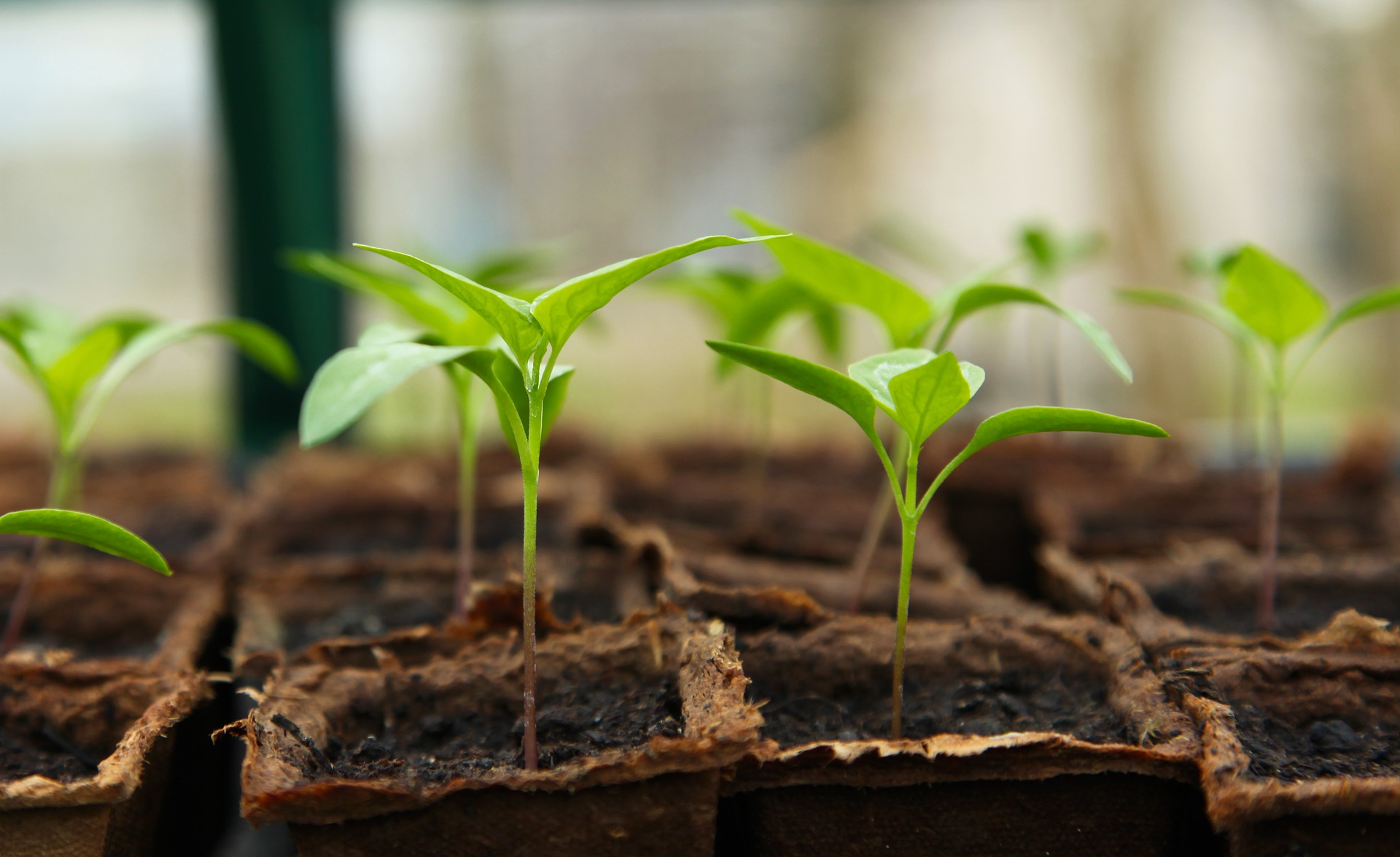 Changes to the laws of seed registration at a national and EU level, partly in response to the demands of the globalised agricultural industry, threaten Croatia's produce and cuisine
Changes to the laws of seed registration at a national and EU level, partly in response to the demands of the globalised agricultural industry, threaten Croatia's produce and cuisine
Monitoring the proposed changes are an army of environmental activists, small-scale producers, family farmers, gardeners and concerned citizens. Spearheaded by three organisations – The Croatian Organic Farmers Association, Life - an organisation of small scale farmers, and Bio-Garden, an organisation made up of gardeners and seed savers - a petition has this week been put before the Croatian parliament objecting to several elements of the proposed new legislation. Earning the support of some 77 Croatian organisations, including farming groups, cattle breeders, plant growers, a network of environmental organisations, permaculture initiatives, gardeners' organisations and even the Chamber of Agriculture, which includes all the farmers inside Croatia, the petitioning of parliament has galvanised many different people in its objection. They say that the proposed new legislation will remove the rights and freedoms of small scale producers and family farms to use their own seeds. This will radically affect Croatia's produce and cuisine.
It is doubtless that there is a worldwide trend, pushing everyone who grows towards buying seeds from globalised agricultural giants. And so, while the response from a broad group of those immediately concerned is impressive enough, awareness of the issue needs to extend much further. It should include every Dalmatian tavern owner and chef who delights a foreign visitor. It should include every single person in Croatia who buys food from a public marketplace. It should include everyone who takes pride in home cooking. It should include the entire tourism industry of Croatia and every visitor to Croatia who has ever enjoyed the food here. Because it is the very distinctive, authentic and traditional nature of Croatia's produce and cuisine that is at stake. Croatia is at real risk of losing the flavour of its food.
“Let me start 10, 000 years ago, when agriculture first started. That's when people learned how to save seeds,” explains Sunčana Pešak, a graduate of Zagreb University's Agriculture Faculty and a member of the three combined groups objecting to the proposed new law. “What these people learned was to save the seeds only from the best part of the harvest. That's what they would use to grow the next season. That's how farming always was. And, it's the way that we got all of the genetic diversity of all the grown foods we eat.”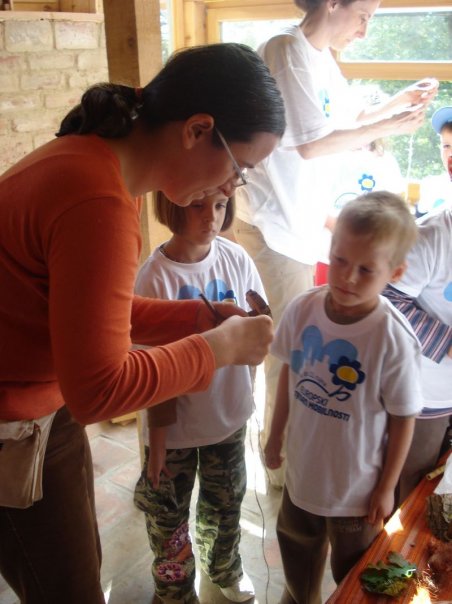 Sunčana Pešak, a graduate of Zagreb University's Agriculture Faculty and a member of the three combined groups defending Croatia's produce and cuisine by objecting to the proposed new seed law
Sunčana Pešak, a graduate of Zagreb University's Agriculture Faculty and a member of the three combined groups defending Croatia's produce and cuisine by objecting to the proposed new seed law
That way of saving seeds still exists. It's what all gardeners and small-scale farmers use. But, now there is something new – industrial farming. They have a different way of saving seeds. This involves a scientific approach to breeding and an industrial approach to growing and harvesting. This is problematic because only around 10 companies in the whole world own the rights to the scientifically manufactured seeds used on this scale of farming. They own the patent rights to the seeds they have created. And, they always want their profits from their seeds being used. These companies are the same ones who produce the chemicals used in industrial farming. They control most of the seed market all over the world.”
The current problems facing small-scale producers and family farmers, brought to a head by the proposed new law in Croatia, essentially come from a clash between industrial-level seed breeders, who control the global market and who demand royalties on their patented seeds, and farmers who just want to grow.
“The term 'Seed variety' itself is a commercial term,” explains Sunčana. “This is something that can be described and catalogued as distinct. All of the plants and their fruits needs to look the same to be identified as this variety. In this way, it can be marketed. But, for people who grow from their own indigenous seeds, in their own traditional ways, their crop is much more diverse.”
“For example, in Croatia, before seed breeding started, people just grew from their own seeds. They would exchange seeds among themselves and eventually each village had its own unique varieties of crops. You could go 20 minutes down the road and the carrots that were grown in the next village were completely different to the ones you grow in your own. Some of the carrots were big, some small, some looked weird, some took on a white colour because they mixed with the wild-growing varieties. Also, as a small producer, you might employ the use of a combination of seed. You plant it and when it grows you get completely different kinds of plants. People might have a winter mix and a summer mix. It ensures diversity in growing and in the diet. Even with grains, by planting a mixture you might ensure a harvest is more resistant to a pest or a weather intervention. One element of the proposed new law would prevent those kinds of mixtures being planted and we would lose completely the initiative and experience of farmers who do so.”
“They proposed new seed law seeks to regulate everything. The demands asked of small scale farmers under it are the same one asked of industrial-scale farmers – they are all placed on the same footing. If you want to use a seed of your own, you have to register those traditional varieties in a system that is currently undefined. Why? Just let people grow. It is their right.”
The groups objecting to the proposed new law in Croatia have found some allies in their fight. Small scale producers and the owners of family farms around the world have been battling against the monopolisation of the farming industry by a handful of globalised giants for many years. They are organised and have teams of lawyers working on their behalf. They have lent support to Croatia's collective of objectors in their fight, helping to point out that the new proposed law goes against the rights not only of EU citizens but against global human rights. "States shall recognize the rights of peasants to rely either on their own seeds or on other locally available seeds of their choice, and to decide on the crops and species that they wish to grow." says the United Nations Declaration on the Rights of Peasants and Other People Working in Rural Areas.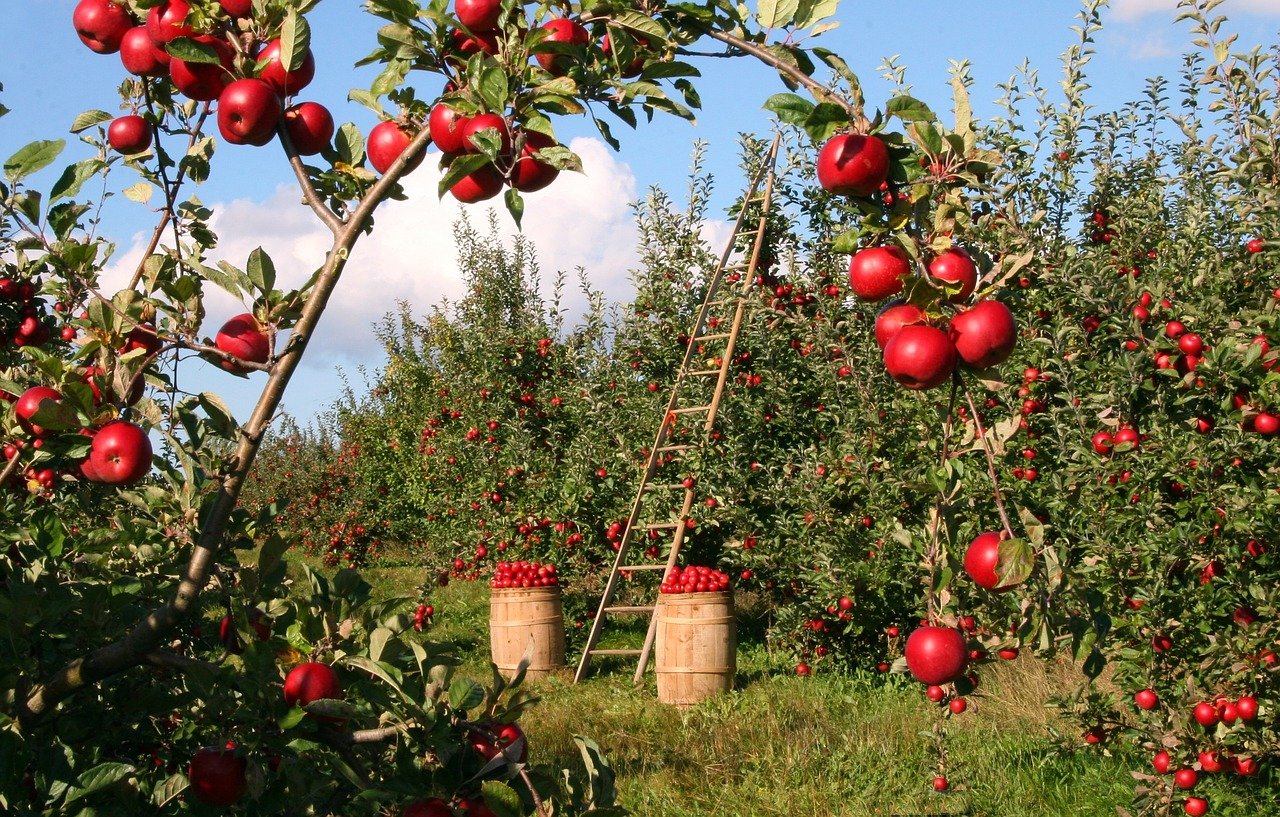 Traditional farming and time-honoured seed varieties help make Croatia's produce and cuisine unique in Europe. Croatia currently stands strong against the pressure from globalised agriculture to accept GMO produce. Can it stand as strong against its demands for new registrations of seeds?
Traditional farming and time-honoured seed varieties help make Croatia's produce and cuisine unique in Europe. Croatia currently stands strong against the pressure from globalised agriculture to accept GMO produce. Can it stand as strong against its demands for new registrations of seeds?
“The risk is huge,” says Sunčana, when asked what might happen to Croatia's produce and cuisine if the proposed new law passes without objection. “In just the last 100 years we lost 75% of our genetic biodiversity. That happened quite simply because people started buying seeds instead of saving them and then growing their own. All of the seeds that are now grown are quite alike. They take varieties that are proven to be the best, to grow to a maximum yield, to be resistant to pests and weather and which can grow successfully in all the different climates of the world. These are varieties that are standardised, well suited to industrial farming – they all ripen at exactly the same time, assisting mechanised harvesting. But, that logic does not always suit small scale farms, where you might need to grow from seeds whose plants reach maturity over an extended period. This gives you many weeks of opportunity to harvest and to sell on different market days.”
But, it isn't just a loss to the convenience of family farmers that would be enforced by the new law. Nor it is solely a matter of losing the tastes of traditional varieties of vegetables and fruits within Croatia's produce and cuisine. The loss to our collective health from this massive reduction in the variety of genetic biodiversity in our diet is currently unknown. Future effects could be catastrophic. Not only that, we could rapidly be losing crop varieties that might better adapt to the new conditions that will be imminently brought about by climate change.
“People with small farms already have enough trouble dealing with bureaucracy and administration. There's no way that all of Croatia's growers will go through the timely ordeal of registering every seed we have,” explains Sunčana, detailing another stipulation that lies within the proposed new change of law. If growers don't wish to register their own distinct varieties - which may have been preserved within their families or communities for generations, they always have the option of going to the National seed bank and taking from there, seeds that have already been registered. Unfortunately, only 27 such seeds exist within Croatia. And the seed bank can only supply such a small amount that it may take a small scale farm several years to build up the supply they need for their business.
The proposed new change of law in Croatia is extremely complicated, as will be the procedures and demands on growers if it passes. The change in seed regulation at an EU level could be similarly restrictive to non-industrial farmers and growers. But, though it is the Croatian government – and then the lawmakers of the EU – who will be addressed by the objections of farmers, growers, gardeners and biodiversity organisations, it is ultimately the profits of a small cabal of globalised and increasingly industrial agricultural/chemical giants which lie at the heart of the demand for change. They are a force of near incomparable strength.
On the surface, the issue of seed regulation might appear to really matter only to those who have a small to medium-sized business growing tomatoes or similar. But, the reality is that this issue concerns us all - everyone who puts a tomato on their fork, on their children's plate or on the table of an overseas visitor who will never forget the distinct flavour of Croatian food. It is the flavour of the future, and the reputation of Croatia's produce and cuisine, for which the fight is currently being made.
Gavrilović Donates Building, Land for Future High School in Petrinja
ZAGREB, 15 January, 2021 - The Gavrilović meat industry has donated one of its buildings and land for the construction of a secondary school, playground, parking lot and other infrastructure in Petrinja, the company said on Friday after a donation contract was signed with representatives of the Petrinja High School.
The Gavrilović company, based in the town that was hit by a 6.2 magnitude earthquake on 29 December, when the town high school was also destroyed, said it was donating a 2,400-square-metre building and a yard with an area of more than 8,000 square metres.
The donation was made in line with a promise the company's CEO, Georg Gavrilović, gave Prime Minister Andrej Plenković during his visit to the town, to help in the speedy normalisation of life in the town.


